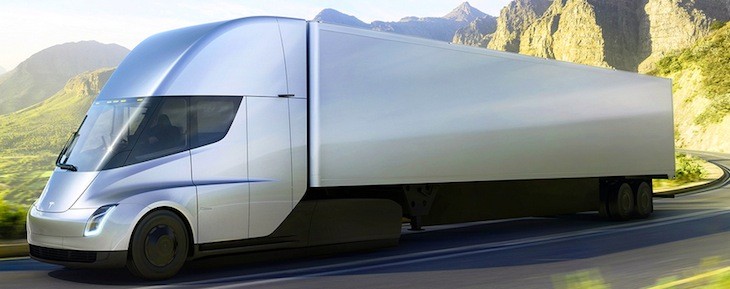J.B. Hunt, Wal-Mart reserve Tesla electric big rig, analyst questions battery life, cost
by November 17, 2017 4:20 pm 1,908 views

J.B. Hunt Transport Services announced it has reserved “multiple” Tesla big rigs after the battery-powered electric truck was unveiled Thursday (Nov. 16), but many questions remain such as battery longevity and the decision of the electric vehicle manufacturer to enter this market.
Lowell-based carrier J.B. Hunt plans to use the Tesla Semi in its intermodal and dedicated segments on the West Coast. Bentonville-based retailer Wal-Mart Stores plans to test the Tesla trucks in the United States and Canada as part of its alternative fuel strategy and has reserved 15 of the trucks, according to CNBC.
“Reserving Tesla trucks marks an important step in our efforts to implement industry-changing technology,” said John Roberts, president and CEO of J.B. Hunt. “We believe electric trucks will be most beneficial on local and dray routes, and we look forward to utilizing this new, sustainable technology.”
Dray or drayage refers to the trucks that transport freight to and from railroads as part of the carrier’s intermodal segment, which accounted for 66% of the company’s total operating income in the third quarter. In its dedicated segment, the carrier is focused on expanding its final mile delivery and highlighting “predictive delivery, particularly targeting within an hour delivery window for customers,” according to Brad Delco, trucking/transportation analyst for Stephens.
Earlier this week, Tesla CEO Elon Musk said in a tweet the company was going to announce an electric big rig that “will blow your mind clear out of your skull and into an alternate dimension.” In a company update, “Part ‘Blown Away,’ Part ‘Blowin’ in the Wind,” Jefferies automotive analysts expect production of the Tesla Semi to start by 2019; however, competitors “appear well advanced on electric trucks.” Tesla is “slightly more specific on details than peers but still missing key parameters, particularly on battery longevity which will determine depreciation to reliably work out (total cost of ownership) vs. diesel.”
Some of the unique factors of the truck compared to competitors include it is a class 8 truck, has a range of up to 500 miles and gross vehicle weight of 80,000 pounds.
“The range is higher than the 300 miles we expected and more than double what trucks peers have disclosed so far,” according to Jefferies. “Tesla also indicated the possibility of 400 miles worth of range in 30 (minutes) through a ‘Megacharger.’”

Musk said the battery life is expected to last 1 million miles, which is similar to existing diesel trucks, but the Jefferies analysts questioned “longevity given additional strains from load and the ability to rely on single-gear transmissions.”
Also, Tesla claims that total cost of ownership will be over 20% less than diesel “do not add up to our understanding of truck running costs,” according to Jefferies. The estimated cost for the Tesla Semi is at least $135,000, or 35% more than a diesel truck.
“Starting with an estimated $1.60 per mile (total cost of ownership), keeping driver costs constant, cutting maintenance 50% and fuel costs 65%, we derive a selling price including battery of only 15% above a current diesel truck based on Tesla’s claims,” noted the Jefferies report.
In an industry note on transportation equipment manufacturer Cummins, Michael Baudendistel, transportation analyst of Stifel, said the vehicle type that’s “best suited” for electric vehicles is transit buses where electricity is inexpensive or government subsidies are offered. But over-the-road, long-haul trucks are not “well suited for electrification.” In the middle are trucks such as local pickup and delivery vehicles.
“It is perplexing to us that Tesla would target a market that is one of the worst candidates for electric vehicles,” Baudendistel said. “That is not to say that Cummins believes that electrification will never have a place in on-highway heavy duty trucks, but rather, Cummins demonstrated at its technical centers that its diesel engine products will offer progressively more hybrid electrification for the purposes of increasing fuel efficiency while also extending range.”
In August, Cummins announced an all-electric truck with a range of 100 miles. The two-axle Aeos is a class 7 truck, a class smaller than the Tesla Semi.
Other statistics Tesla claimed are the truck runs from zero to 60 mph in 20 seconds fully loaded, climbs a 5% grade at 65 mph and has “instant traction control” with its four independent motors on rear axles. It has fewer systems to maintain, will provide more than $200,000 in fuel savings and have a two-year payback period. It’s also expected to be safer than existing trucks, with its collision avoidance system, a driver’s seat that is at the center of the cab and a low center of gravity to prevent rollovers.
In a Transport Topics webinar, Seth Clevenger, who attended the unveiling of the Tesla truck, described some the benefits of the truck from a maintenance standpoint, including its four motors but only need two to run and lack of transmission or diesel particulate filters. The truck will offer drivers “a wide view,” with the seat at the center, and two large touchscreen panels on either side of the steering wheel will replace the instrument panels.
Clevenger was uncertain how more experienced drivers would respond to the technology, but said it might attract younger drivers to the profession who haven’t previously considered it. Also, the Tesla Semi might change behavior of drivers in that during their 30-minute break or while the truck is being unloaded they could charge their truck.
Reservations for the Tesla Semi can be made on the company’s website, and are $5,000 per truck. The reservation payment “may be cancelled at any time, in which case you will receive a full refund,” according to Tesla’s terms and conditions.
J.B. Hunt didn’t disclose the investment into the trucks, but it’s not part of its “five-year, $500 million investment to improving operating systems, developing cloud infrastructure and creating innovative and disruptive technologies. The additional investment in Tesla trucks further demonstrates J.B. Hunt’s commitment to meeting the needs of an evolving supply chain and introducing new technology for its customers and employees.”
